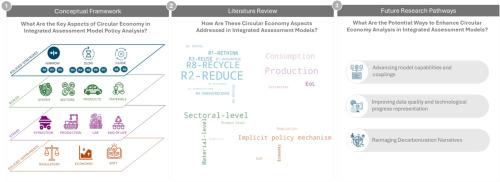Unlocking circular economy policies in integrated assessment models
IF 10.9
1区 环境科学与生态学
Q1 ENGINEERING, ENVIRONMENTAL
引用次数: 0
Abstract
The circular economy (CE) has emerged as a promising strategy to simultaneously address climate change and the over-exploitation of Earth's resources. Yet, most Integrated Assessment Models (IAMs) lack the capacity to fully assess the potential benefits and drawbacks of CE policies in the context of climate change. This paper provides a structured approach to improve the representation of CE in IAMs and guides their application in climate policy assessments. To this end, we first propose a framework to organize the multiple layers and policy dimensions involved in CE. We then review the current state of CE modeling in IAMs and identify critical gaps, including limited attention to policy mechanisms, lack of material-level granularity, and insufficient coverage of downstream and upstream supply chain sectors. Lastly, we identify priority areas for improvement, such as coupling IAMs with material flow and sectoral models, refining data and structural assumptions, and developing more coherent CE policy narratives. Together, these steps establish pathways for the scientific community to better integrate CE into IAMs and strengthen understanding of its role in global climate mitigation strategies.

以综合评估模式解锁循环经济政策
循环经济(CE)已经成为同时解决气候变化和地球资源过度开发的一种有前途的战略。然而,大多数综合评估模型(iam)缺乏在气候变化背景下充分评估环保政策潜在利益和缺点的能力。本文提供了一种结构化的方法来改善生态环境评价在iam中的代表性,并指导它们在气候政策评估中的应用。为此,我们首先提出了一个框架来组织行政长官所涉及的多层和政策维度。然后,我们回顾了iam中CE建模的现状,并确定了关键差距,包括对政策机制的关注有限,缺乏物质层面的粒度,以及下游和上游供应链部门的覆盖不足。最后,我们确定了需要优先改进的领域,例如将iam与物料流和部门模型相结合,完善数据和结构假设,以及制定更连贯的CE政策叙述。总之,这些步骤为科学界更好地将环境评价纳入综合评价体系并加强对其在全球气候缓解战略中的作用的理解开辟了途径。
本文章由计算机程序翻译,如有差异,请以英文原文为准。
求助全文
约1分钟内获得全文
求助全文
来源期刊

Resources Conservation and Recycling
环境科学-工程:环境
CiteScore
22.90
自引率
6.10%
发文量
625
审稿时长
23 days
期刊介绍:
The journal Resources, Conservation & Recycling welcomes contributions from research, which consider sustainable management and conservation of resources. The journal prioritizes understanding the transformation processes crucial for transitioning toward more sustainable production and consumption systems. It highlights technological, economic, institutional, and policy aspects related to specific resource management practices such as conservation, recycling, and resource substitution, as well as broader strategies like improving resource productivity and restructuring production and consumption patterns.
Contributions may address regional, national, or international scales and can range from individual resources or technologies to entire sectors or systems. Authors are encouraged to explore scientific and methodological issues alongside practical, environmental, and economic implications. However, manuscripts focusing solely on laboratory experiments without discussing their broader implications will not be considered for publication in the journal.
 求助内容:
求助内容: 应助结果提醒方式:
应助结果提醒方式:


